On this blustery pre-Christmas night, I find myself enjoying the warmth of a pizzeria in the heart of Naxos, an eponymous town on a Cycladian island in Greece. Quiet moments like this are often why I travel.
A 20-minute walk would get me to Portara, the hulking marble doorway perched atop a hill that now has a landbridge leading to it, thanks to the considerable rise of the Mediterranean and Aegean Seas since ancient times. Construction of Portara, and the temple it once led into, were begun in 530 BC by the tyrant Lygdamis, who would be overthrown in 506 BC, leading to the abandonment of the then-unfinished temple. It’d be nearly 1700 years later before the Venetians would plunder its remains to construct their own indulgent erections. Nearly another millennium past the Venetians, here I am, snapping photos of it with romantic thoughts of time past.
Travel has made one thing apparent to me: We are constantly caught in the ebb and flow of what is and what once will have been.
Drawing Circles in the Sands of Time
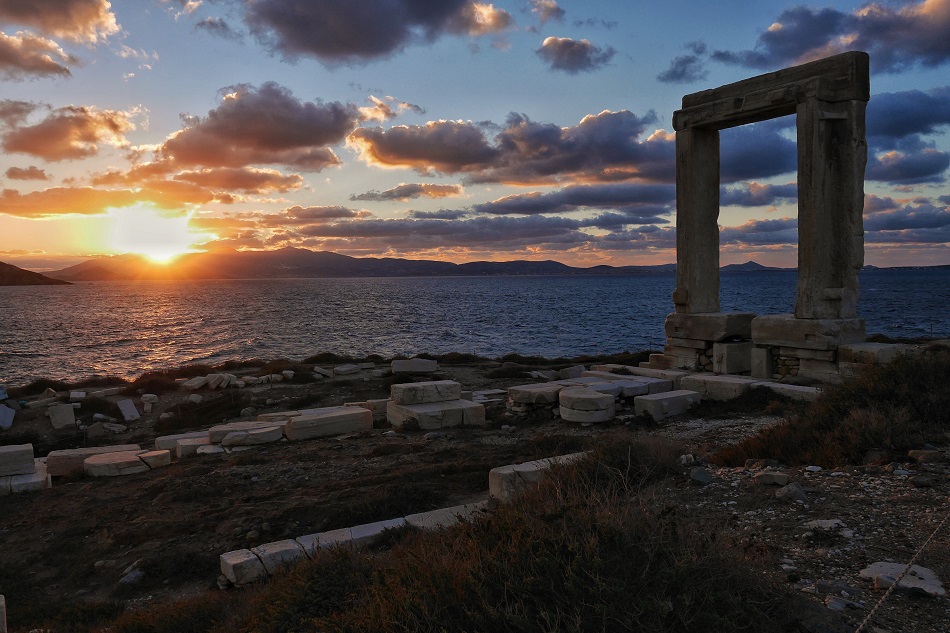
Portara, Naxos, the gate to the unfinished, then abandoned, temple dating back 2,500 years. That’s 500 generations who have walked around this ruin, absorbing the setting sun from this very spot. Why I travel is because we should, because we can, because it may not be here tomorrow.
I have stood upon the ruins of the Zapotec in Oaxaca, gazing out at the city they once commanded, which would stun many today to know was 42-square kilometres in size. We look to the past as if all failed societies were ruled by people who couldn’t know better than to avoid their demise. It is arrogance at best, ignorance at worst, and is always, incontrovertibly, wrong.
They’ll tell you wisdom is the realization of how little one knows. To that end, no society then and no society now has ever truly been wise. We all think we know better than those who preceded us, and we’re wrong. Ultimately the same mistakes get made, the same ends get reached. We all become sands in the dust of time. Same-same but different.
I have thought much of self-destruction in the last year, in both the global and the personal sense. So much has this line of thought consumed me that I now find myself reading Jared Diamond’s Collapse: How Societies Choose to Fail or Succeed.
Motivating Factors
A question I frequently find myself asked is why I’ve chosen to travel now, to this extent. When people ask why I travel, it’s hard to explain. “Because I can,” I tell them, knowing it’s easy to understand. Because time is ticking, because it’s possible, because today is better than tomorrow. Pick your answer; they’re all true.
Another reason, though, is harder to explain and still harder to swallow. Because of impending doom.
True, but also not. I’m of the generation raised with books like William Golding’s Lord of the Flies and John Wyndham’s Chrysalids. I grew up with apocalyptic literature that spoke of a society which doomed itself through greed, unrest, confrontation, and worse.
But I’m also the daughter of a man who was a passionate history fan. My father wasn’t much of a history teacher to me later in his life but he laid the groundwork for who I would become. I’m the writer and thinker I am today because of curiosity he gifted me.
Round and Round We Go
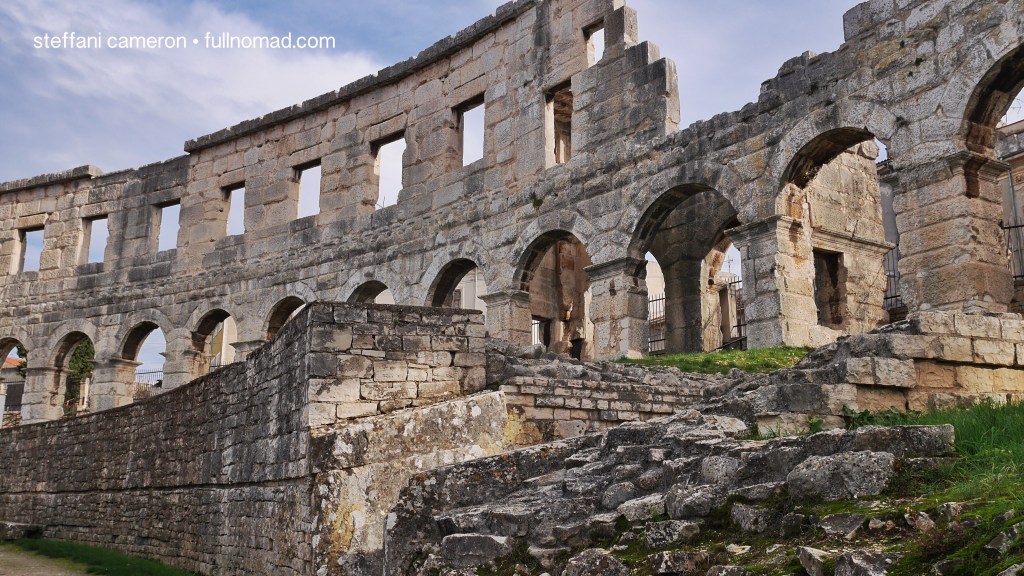
Rome ruled the world. They would be invincible. How could their reign end? But it did. All of them do. Pula Arena, a fine place for me to have been alone for 2 hours on a stormy November day. Why I travel is because I can’t get this feeling, of standing there, from a book.
The true reason I felt it so critical to travel now rather than wait until later is that the world around me seems to be on the cusp of tipping points. Ecologically, economically, culturally, ethnically – you name it. Everything feels to me it’s on the verge, and has been for some time.
That seems so bleak and despondent, but when you’re a student of history, it’s just another fact. It is what it is, because it’s how it’s always gone. Empires rise and fall. Epochs begin and end. There are always times of upheaval, when everything spills and is laid to waste.
You can grow depressed at the horror and the tragedy of all that signifies – the death, the destruction, the wanton waste – or you can take the historical long-view of “Here we go again.”
Yes, it’s terrible when you take the macroscopic perspective of the lives upended, the legacies lost, the erasure of all that came before. Bloodshed, debt, all of that. Terrible, macroscopically. But it’s also just the way it goes. From the Ice Age to the Plague to the Spanish Influenza Epidemic of 1919… life and death have always come and gone in cycles.
Rome, the Maya, Easter Island – so many societies seemed to epitomize the height of human aspirations, yet they all collapsed for a variety of reasons.
Boom, There it Is
As a traveller, I walk through time on a daily basis. All from ages gone that thought they would be remembered as the greatest ever. Now they’re all in ruins, footnotes to history. Tourist traps at best.
So I feel it’s hard not to watch America and the changing times there, the so-called “end of the Republic,” and wonder if they’re next on the horizon for empirical collapse. It wouldn’t be a stretch. Detroit, the harbinger of times to come?
Talk to me too long on these topics, and you’d think I was a callous, evil person who failed to feel love or warmth, who didn’t value human life, who couldn’t comprehend the pain of loss.
But that’s not true, not at all. Loss, in fact, is probably what has helped me take the long-view of how irrelevant I am, how meaningless each of us is.
Dust to Dust
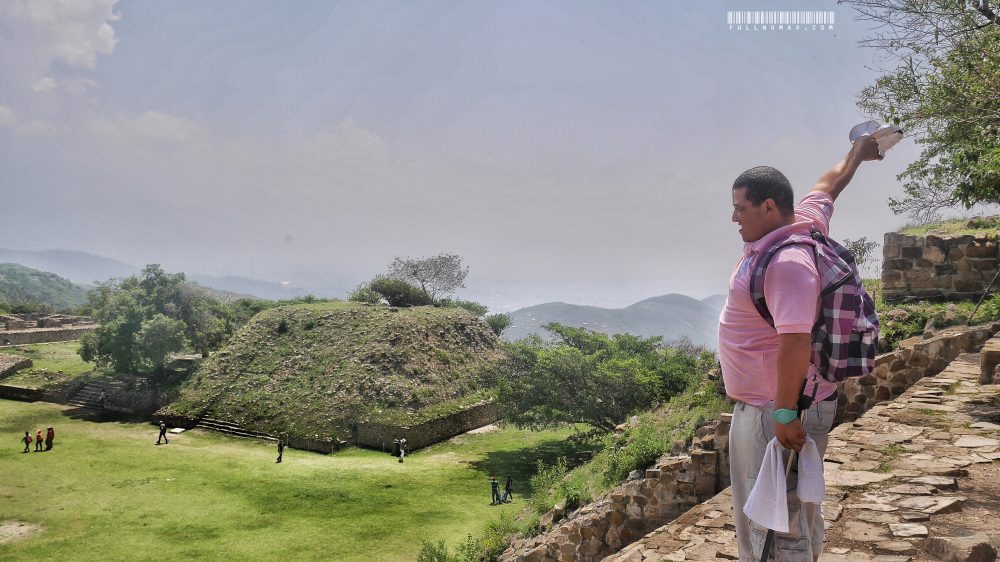
The elevation, 7,000 feet. A fraction of the 42-square-kilometres of ruins of Monte Alban, the Zapotec stronghold from 2,500 years ago. I felt like this dude when I climbed those steps, each about 20-24″ high. Why I travel is because I’m constantly amazed at what we can accomplish. All this was built by hand 500 generations ago.
I can remember sitting on a log on a small beach in Vancouver the week after my mother’s death. I was 26 and it wasn’t supposed to happen like this. She was supposed to live until I was 50, see me marry, watch me grow, teach me all the things.
But she was dead and my life felt stopped in its tracks. What now? How could I continue?
The horror, the horror. But the clerk at the supermarket didn’t care. The bills kept coming, obligations persisted, I had to buy milk, of all things. Life was over, but I needed milk. Work scheduled me for another shift. And so it continued. Life, it seemed, went on. I wasn’t even a cog on the wheel in the machine of life. I was a speck of grease, at best.
However important you think you are, upon your death you will be relieved of that delusion, because you don’t matter. I don’t matter. We’re a passing phase of heartbreak, if anything at all. Legacies? Pfft, they’re a blink in the eye of cosmology.
This likely is depressing to some, arguable to others, and that, too, doesn’t matter. Your opinion is irrelevant, because time is the only judge.
Delusions of Google Grandeur
It’s easy to be a child of this generation and cite a Google reference or two as evidence of the opposite, argue that all of us leave a track or footprint.
But there came a moment when I thought more deeply on this: I truly was irrelevant. There was no long-view on my significance. I could die tomorrow and, probably within a decade or so, it wouldn’t matter anymore. I would be the person people struggled to remember by name. “Remember… oh, what was her name?”
That clicked and I finally realized how freeing that was. How inconsequential are my accomplishments, my failings. None of them really matter. My legacy will be pointless. But what I can do is simply enjoy my life, absorb all I can. It’s for me, not you, not the history books, nor the tomorrows.
Sure, death is sad, tragic, heartbreaking, but it is just another in a chain of human experiences. It is part of what makes us complete as humans. Inevitably we all have to learn to grieve and then let go.
The same is true of humanity. We come, we go. We rise, we fall. Prosperity, collapse. That’s the evolution of society, the tides of humanity. To get wrapped up in it is foolish sentimentalism.
Unfortunately, we are all human. You, me, the guy next door. We get wrapped up, it’s what we do. Delusions are our plaything.
The Necessary Tragedy of Death
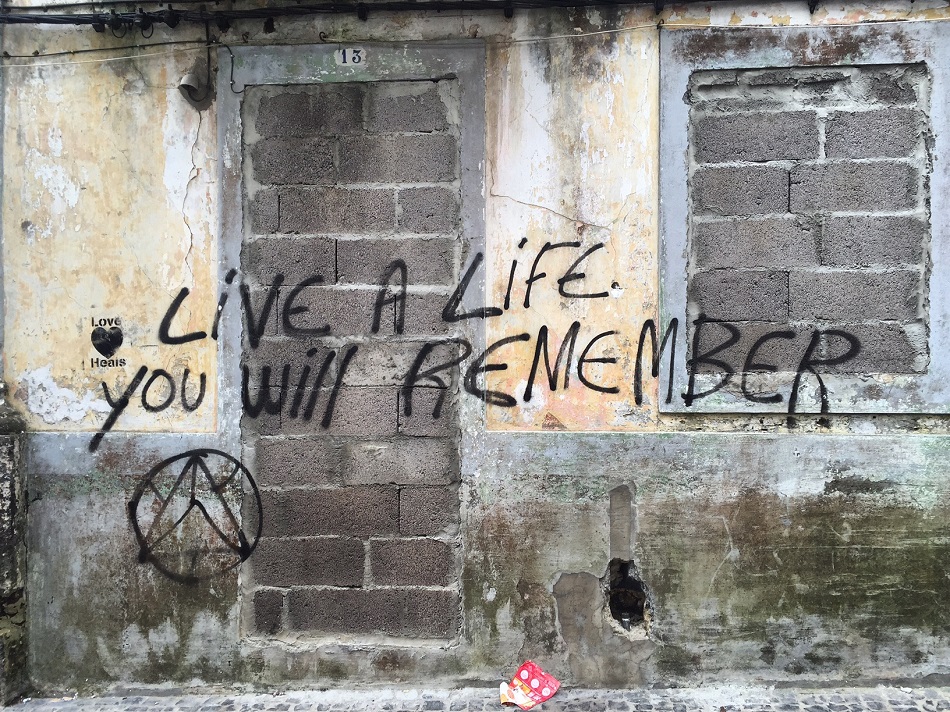
One of my all-time favourite photos because it’s really my only goal. It doesn’t say live a life others will remember. It’s all about me. When I take my last breath, I want my life to flash by my eyes and my last words to be “Well, it was a hell of a ride.” That’s why I travel.
When I see catastrophe, my heart breaks. When I hear of mass shootings, I’m desolate. Upon my father’s death, I was shattered. I’m not inhuman. I too am affected.
But then, deep down inside, I’m consoled by the fact that this is all part of life’s ebb and flow. Your father will die too, if he hasn’t already. Your mother. His, hers, theirs. All will die. We will all be sad, broken. To live is to feel, right?
As many wise dead people before me have said, death is the point of life. Dying is what we are all in hot pursuit of from the moment we are born. That it should leave us so despondent is almost comical given its omnipresence, but anyone with a heart understands loss.
And, so, I find myself walking through ruins, bear-hugged by history, aware that we’re all doomed to eventual obsolescence.
Collapse v2.0
Born and raised in one of the youngest cities on the globe, it’s no wonder I grew up so ignorant of our impermanence. In travel, though, I have learned to shake this naivety and now I understand the sad, desolate beauty of how fleeting it all is.
The construct of capitalism as we know it is, give or take, a couple hundred years old. Looking at history, that’s a good run of things. So many societies existed in a 200- to 500-year window. They didn’t have wide-spread science, computers, means of measurement, recording, or communicating. They didn’t see their demise coming at them like a head-on collision in the headlights.
I don’t think society will collapse tomorrow, or necessarily even in a decade, but it’s coming. We’re in a time of upheaval which isn’t a measurable event on a predictable trajectory. To assume the world will be business-as-usual when I’m in my 60s, two decades from now, could be naïve at best and tragically foolish at worst.
Whatever else is happening in the world today, climate is indeed changing coastlines around the world and ecological regions are changing quickly too. Warming waters see drastic difference in wildlife, fish stocks, and the outcomes defy prediction. Look at the polar ice melt going on right now, in the dead of winter. Yes, change is coming.
Why I Travel: My Eyes are Wide Open
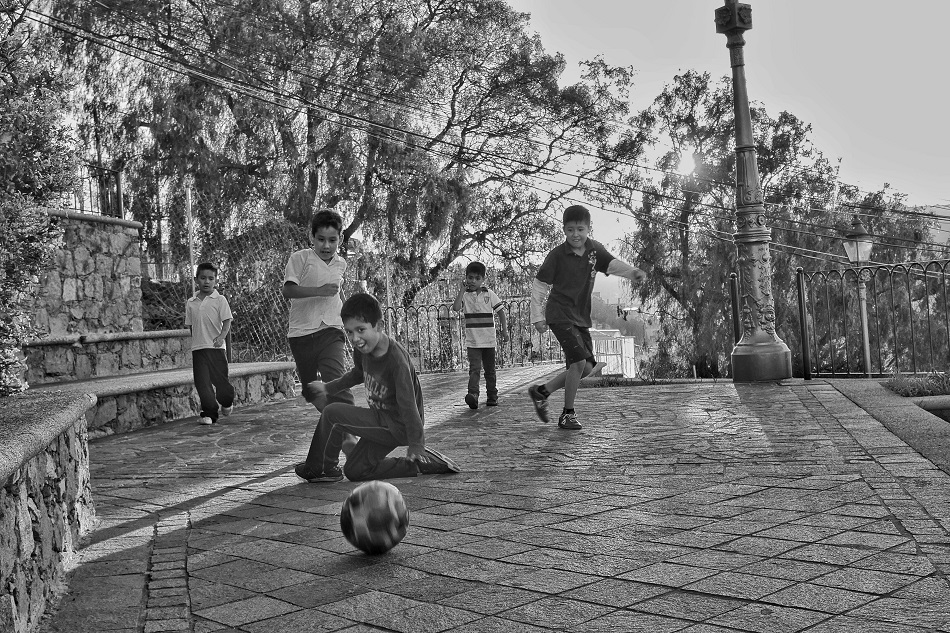
Life is a game we play. It starts, it ends, and the question is whether we enjoyed ourselves, played fairly, and can live with the result. So, why I travel is to enjoy the game and see as much of the world’s beauty today as I can. That’s enough for me. Is your life enough for you? There’s still time.
I don’t purport to understand where all this is headed, and I don’t even believe it’s destined to be all bad news for humanity. We have adapted and changed throughout the millenniums. Our future is complicated and my crystal ball is on the fritz.
What I can tell you, though, is that I see where we are as being in a state of flux, and I know what it’s like to blink and see things gone, left only with the lingering taste of regret.
So, you ask me why I travel? Because I can, because we’re changing, because I’d rather see us now than in the rear-view mirror, because tomorrow is never assured for any of us.
And perhaps there is impending doom. But if there is, the world will continue to turn and somehow, somewhere, someone will survive it, and a future will be there, but for how many of us? Good question.
It is what it is. We are what we are. And today I can travel, so I do, and it is all good and beautiful and everything I could have hoped for, even when it’s never what I expect. Because, that, too is part of the unending appeal of life.



My sentiments exactly. Thank you for putting it into words.
Great read! I say “I don’t know how much time I have left”, because no one does. And I don’t want to have any regrets when I’m old. And I look forward to growing old and sitting in my chair and reliving some of the amazing adventures I’ve had, and the wonderful people I’ve met, because I took the leap and bought the plane ticket and went to discover what’s out there!